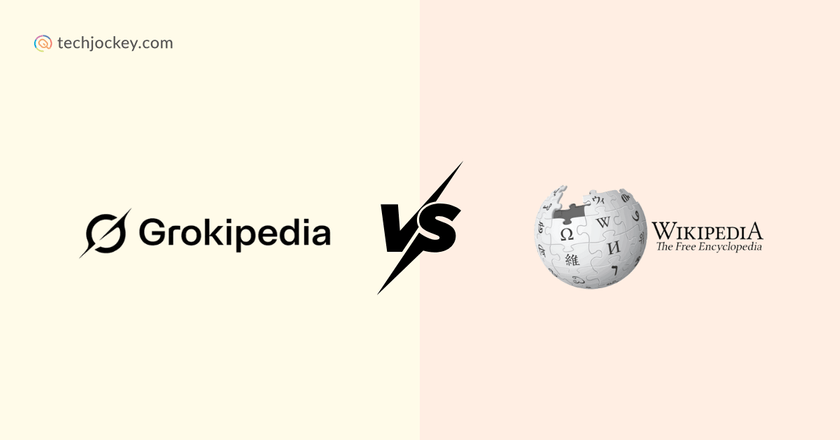Grokipedia vs Wikipedia: The Battle for the Future of Knowledge

When no one ever imagined that even Wikipedia, the world’s free library of knowledge, could have a rival and then something unexpected arrived: Grokipedia. It is the beginning of a new chapter, where knowledge just does not sit still on pages, but evolves, responds and resonates with the people who seek it.
In the age of information, while Wikipedia was considered indispensable, Elon Musk’s xAI introduced a bold new challenger and the debate of Grokipedia vs Wikipedia began. It is an AI-driven encyclopedia powered by the intelligence powered by the rise of generative ai tool Grok., xAI’s conversational model.
So, what sets Grokipedia apart from its older sibling? And could it really reshape how humanity records knowledge online? Let’s read below.
What Is Grokipedia?
Grokipedia, launched on October 27, 2025, is Musk’s bold vision of a faster, and less biased alternative to Wikipedia. The platform is powered largely by AI-generated and AI-verified articles, created and fact-checked by Grok itself.
The goal: create a living encyclopedia that continuously learns, updates, and corrects itself – ditching the human intervention largely.
Despite the ambitious beginning, the reviewers showed no mercy and remained too honest for Musk’s Grokipedia as they found articles copied or lightly modified from Wikipedia, raising both legal and ethical concerns.

Grok
Starting Price
$ 30.00
What Is Wikipedia (and Why It Still Matters)?
Run by the nonprofit Wikimedia Foundation, Wikipedia was founded in 2001 by Jimmy Wales and Larry Sanger, becoming a one-of-its-kind platform on the internet that shares free open-knowledge.
Wikipedia’s defining traits:
- Anyone can edit.
- Every change is tracked.
- Content must follow a neutral point of view (NPOV).
- Articles rely on verifiable sources, not personal opinions.
Wikipedia’s prowess is justified by its open model that has created over 6 million English-language articles, available in more than 300 languages. Another feat for the platform is its website which is the most-visited in the world.
Grokipedia vs. Wikipedia: Head-to-Head Comparison
| Feature | Wikipedia | Grokipedia |
|---|---|---|
| Ownership | Nonprofit (Wikimedia Foundation) | For-profit (xAI / Elon Musk) |
| Content Creation | Written & reviewed by volunteers | Generated & reviewed by AI (Grok) |
| Transparency | Public edit histories & talk pages | Opaque AI generation, limited user editing |
| Size | 6M+ English articles | < 1 million at launch |
| Neutrality Policy | Neutral point of view (NPOV) enforced | Claims to reduce bias, but AI bias concerns remain |
| Licensing | Creative Commons (CC BY-SA) | Partially derivative, unclear long-term licensing |
| Revenue Model | Donations | Proprietary, integrated into xAI’s ecosystem |
| Languages Supported | 300+ | English (with others “coming soon”) |
| Editing Access | Open to all | Restricted / AI-curated |
| Fact-Checking | Community & citation-based | Algorithmic & model-driven |
The Philosophical Divide
Wikipedia’s Humanism
Wikipedia is based on the idea that people, by working together, can get closer to the truth. Mistakes can happen, but remaining honest and teamwork help fix them. Every article has a talk page where people discuss, correct, and improve the information over time.
Grokipedia’s Algorithmic Vision
Musk’s project takes a different approach. Instead of many people debating what’s neutral, Grokipedia uses AI to understand and balance different views automatically. In theory, this can reduce human bias, but in reality, it may bring in machine bias, depending on the data and rules the AI has learned from.




Grok
Starting Price
$ 30.00
The Controversy: Copied Content and AI Bias
The much talked about Wikipedia competitor became talk of the town for not so good reason soon after its launch. The Verge and Business Insider reported that numerous Grokipedia entries appeared to be copied directly from Wikipedia. The change appeared in the content was too minor and those were considered negligible.
These pointed several stories such as:
- Whether Grokipedia is truly innovative or simply repurposing open content.
- How AI platforms should attribute and license data used in training and generation.
- The danger of misinformation loops, where AI systems reference AI-generated material without human oversight.
Musk’s team, defending its brainchild, said that Grokipedia uses publicly available data with fair licenses to make the information better by eliminating errors. But critics worry that if there’s no human review, these AI improvements could create a cycle of information that sounds accurate and convincing, but might not always be true.
Under the Hood: How Grokipedia Works?
While xAI hasn’t published full technical details, available insights suggest:
- Articles are AI-generated using Grok’s large-language-model framework.
- AI editors cross-reference public data (including Wikipedia) and real-time web information.
Grokipedia vs Wikipedia: The Battle for the Future of Knowledge
User contributions are limited; humans can suggest edits, which Grok reviews.
Content updates dynamically based on recent verified data streams from X (formerly Twitter) and the wider web.
Neutrality and Trust
Wikipedia runs on the principles of human trust that also comes with a majority of severe checks. Every editor, no matter their background, must cite reputable sources and maintain objectivity.
Grokipedia, however, claims to overcome bias through AI reasoning.
But who defines neutrality in an algorithmic system? If Grok’s training data or corporate priorities lean one way, that bias can silently permeate every page. Unlike human edits, it’s hard to see how AI reaches its conclusions, which makes the process of creating knowledge less transparent.




Grok
Starting Price
$ 30.00
Final Thought
Grokipedia is an interesting step toward using AI to create and update knowledge faster. It could make information more current and easy to access. But at the same time, it also raises concerns, if the system is fully controlled by AI and not open to public review, there’s a risk of losing transparency and trust.
Wikipedia may have its flaws, but its open and collaborative nature helps keep it honest. Grokipedia’s technology is powerful, but to truly earn credibility, it must also be open about how it works and where its information comes from.
Shobhit Kalra boasts an impressive 12 years of diverse experience across industries, including Digital Media, Digital Marketing and Healthtech. He has a proven track record of creating engaging and impactful content that resonates with readers. In his journey with Techjockey, he has been given the responsibility of crafting... Read more




























